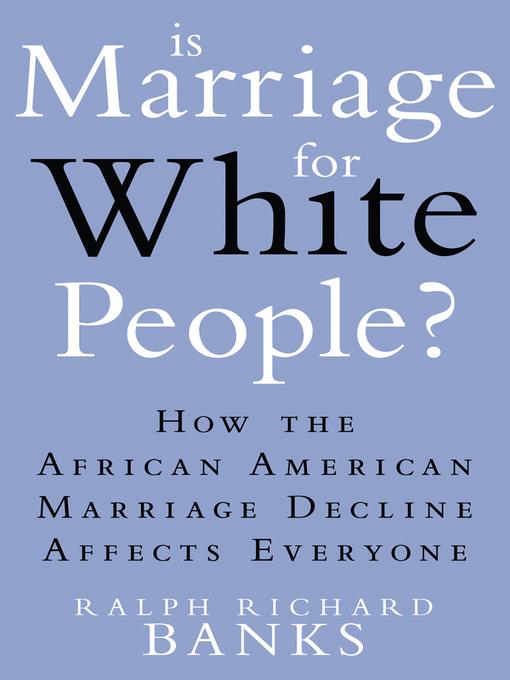
Is Marriage for White People?
How the African American Marriage Decline Affects Everyone
کتاب های مرتبط
- اطلاعات
- نقد و بررسی
- دیدگاه کاربران
نقد و بررسی

June 27, 2011
Banks, a Stanford law professor, examines why black Americans maintain the lowest marriage and highest divorce rates in the nation, focusing most sharply on the high likelihood a black woman will remain single, a product of the scarcity of black men in the marriage market, their number depleted by high incarceration rates. This "man shortage" leaves those who are available in high demand and with less impetus to commit to one woman. In the U.S., wives earn a larger percentage of the household income than ever and are more likely to have completed college than their husbands. This trend is most acute among African-Americans , which coupled with how African-American women outperform their male counterparts contributes to the high African-American divorce rate. Banks suggests that black women should stop being so willing to "marry down" and consider "marrying out"âmarrying nonblack men. Such a choice restores equality to black male and female relationships by depriving black men of the power they enjoy as the result of being scarce commodities. Furthermore, Banks argues provocatively, "for black women, interracial marriage doesn't abandon the race, it serves the race." Peppered with interviews and candid opinions about marriage and relationships, this is a surprisingly intimate scholarly work; the sobering topic is tempered by the author's easy-to-read, captivating style.

June 15, 2011
A scholarly account of African-Americans' encounters with the marriage gap.
In his debut (Law/Stanford Law School), Banks explores the marriage gap between African-Americans and whites, concluding that fewer African-Americans marry and stay married due to "the changing conception of marriage, and the changing educational and economic positions of men and women." Add to this the "numbers imbalance" between the wide array of eligible African-American females and an African-American male population in short supply—an unevenness Banks attributes to incarceration, interracial marriage and a lack of economic opportunities for black men. Banks argues that while many African-American women seek out highly educated African-American men, these same men are statistically more likely to date women outside their own race, prompting the pool of prospective suitors to dwindle further. As a result of this imbalance, many African-American men find little incentive to engage in a monogamous relationship: "Why cash in when you can continue to play?" The author writes that "[b]lack men maintain nonexclusive relationships for the same reason as other men: because they can." Banks tempers his statistically driven arguments by weaving in intriguing personal interviews. This technique, both quantitative and qualitative in its approach, provides the groundwork for a brave and convincing argument—one that reveals a startling trend in the decline of African-American marriages.
A triumphant work that demystifies the intersection between compatibility and color.
(COPYRIGHT (2011) KIRKUS REVIEWS/NIELSEN BUSINESS MEDIA, INC. ALL RIGHTS RESERVED.)

November 15, 2010
The Jackson Eli Reynolds Professor of Law at Stanford Law School, Banks points out that across classes black marriages are declining. In fact, black women are three times as likely as white women to remain unmarried. Why? As black women surge forward in terms of earnings and education, says Banks, they face marrying down or marrying out. Expect some controversy.
Copyright 2010 Library Journal, LLC Used with permission.

























دیدگاه کاربران